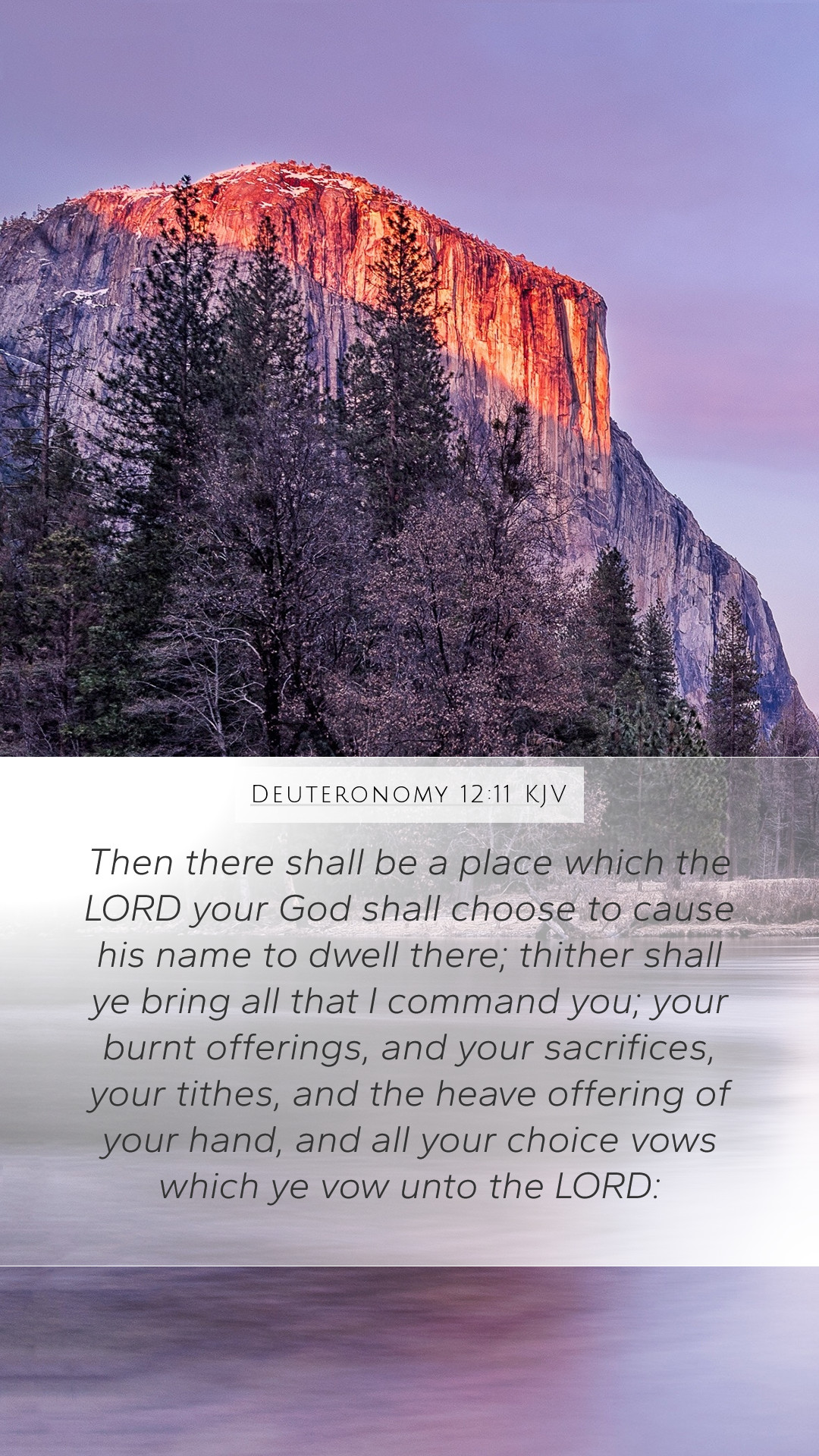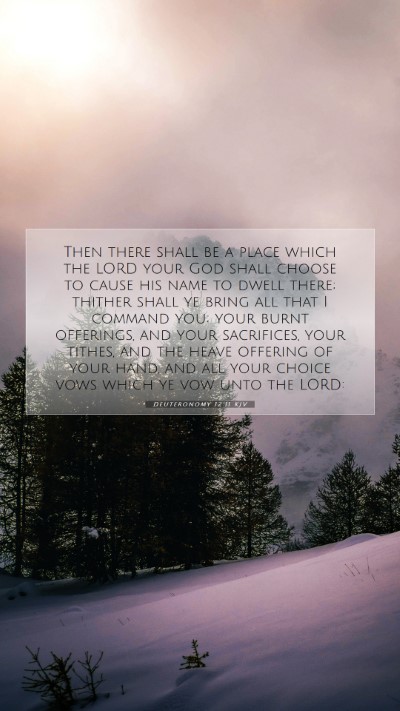Understanding Deuteronomy 12:11
Deuteronomy 12:11 states, "Then there shall be a place which the Lord your God will choose to make His name abide there; there you shall bring all that I command you: your burnt offerings and your sacrifices, your tithes and the heave offerings of your hand, and all your choice offerings which you vow to the Lord."
Bible Verse Meanings and Interpretations
The meaning of this Bible verse revolves around God's establishment of a central place for worship among His people. This location, often interpreted as the eventual site of the Temple in Jerusalem, signifies the importance of communal worship and obedience to God's commandments. As Albert Barnes notes, this command demonstrates God's desire for His people to gather and recognize His sovereignty through sacrifices and offerings.
Matthew Henry emphasizes the importance of this command in relation to the fullness of worship. The specific instructions provided by Moses highlight that the community’s offerings should be made at the designated place chosen by God, illustrating both reverence and the profound connection between the community and their deity.
Adam Clarke further elaborates on the significance of "making His name abide there." This concept of a sacred space is not merely for ritual but establishes an ongoing relationship between God and His people. The sacredness of the place emphasizes the seriousness of worship, indicating that such gatherings must be undertaken with sincere hearts, reflecting a commitment to God's covenant.
Scripture Analysis
-
God’s Choice:
The phrase “which the Lord your God will choose” indicates God’s sovereign authority in deciding where worship should be centered. This expression reinforces the belief that genuine worship should occur in spaces recognized and sanctified by God.
-
Holiness of Offerings:
Moses’ instruction on bringing burnt offerings and sacrifices underscores the holiness required in acts of worship. As noted in commentary, these actions represent both obedience and devotion, meant to maintain a relationship grounded in gratitude and reverence.
-
The Community Aspect:
This verse also highlights responsibility towards community worship. Engaging together in offerings fosters unity among the Israelites, reflecting a collective acknowledgment of God’s authority and goodness.
-
Historical Context:
Understanding the historical context of this command further enhances comprehension of the Israelites' journey. Their transition from a nomadic lifestyle towards establishing a settled existence in the Promised Land necessitated a formalized approach to worship which would anchor their identity as God’s chosen people.
Biblical Exegesis and Insights
This verse serves as an important guide for Biblical study groups and helps in understanding Scripture through careful analysis. It calls for believers to reflect on how God desires to be worshipped and how that applies to contemporary faith practices.
With the emphasis on collective offerings and sacrifices, it raises relevant discussion topics in online Bible study forums about personal vs. community worship and the implications of obedience to God's instructions. The verse invites personal reflection on how one's actions in worship can align with divine commands.
Application of Deuteronomy 12:11 in Daily Life
Applying the lessons from this verse can significantly enhance one's spiritual journey. In our daily lives, the act of dedicating specific times for worship, whether individually or in community, reflects our acknowledgment of God's presence and authority. As Matthew Henry suggests, Christians today can draw parallels in how they allocate their resources—time, talents, and treasures—for the advancement of their faith and community.
Recognizing the importance of a "place" where God’s name abides can manifest in creating a personal sanctum for prayer or participating in local congregational activities, ensuring that worship remains central to our lives.
Cross References
- 1 Kings 9:3 - God's choosing of the Temple as a place for His name.
- Psalms 78:68-69 - The establishment of Zion as God's chosen dwelling place.
- Hebrews 9:1-14 - The contrast between the Old Testament sacrificial system and the new covenant realized in Christ.
Conclusion
Deuteronomy 12:11 emphasizes the significance of a chosen place for worship, symbolic of God’s presence among His people. This verse, when explored through various biblical commentaries, reveals deeper insights into community, obedience, and the reverence due to God. Engaging with such scriptures through Bible study resources and guides can enrich one’s understanding of both the historical and modern implications of worship. Whether individuals seek to interpret Bible verses for personal edification or in discussions within Bible study groups, the principles derived from this passage continue to hold profound relevance today.


